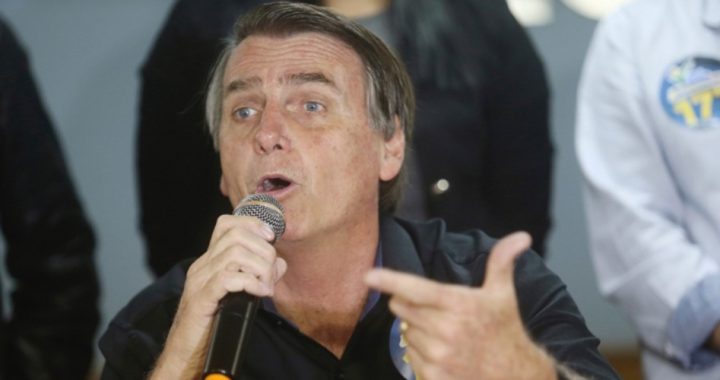
If current polls are any indication of the future, Brazil’s next president might be a pro-gun, pro-life, pro-liberty, pro-property rights, pro-free-market firebrand who hopes to lead a counter-revolution against Brazil’s powerful communist machine.
As in the United States with Donald Trump, the establishment media despises this candidate, and often lies about him. As in the United States with Trump, the Brazilian leader defies the politically correct speech and thought codes promulgated by self-declared elites. And as in the United States, this grassroots uprising is driving the establishment and the Left absolutely bonkers. But unlike in the United States, where virtually every poll showed Trump’s opponent in the lead, Brazilian polling shows this candidate has more than twice as much public support as his nearest competitor.
Meet Jair Bolsonaro (shown), also known as “Tropical Trump,” a label he rejects. The retired Army captain, with his fond memories of the anti-communist military regime that ruled Brazil for two decades, speaks his mind boldly — regardless of what the establishment thinks about it. In fact, his willingness to speak frankly, honestly, and in defiance of the establishment is among the many qualities that has endeared him to a growing segment of Brazil’s outraged electorate. And of course, the congressman-turned-presidential-candidate’s promise to finally bring Brazil’s powerful communist movement to heel has helped, too. His positions on the issues have resonated with Brazilians as well, as evidenced by his surging support. In Rio de Janeiro’s 2014 elections, his candidacy received more votes than any other in the whole state.
Until last week, though, a massive cloud of uncertainty was hanging over the looming general election. Perhaps the most significant factor complicating the race was the potential candidacy of communist operative and former Brazilian President Luiz Inacio “Lula” da Silva, who is currently sitting in jail for a range of serious crimes including corruption and looting the public. Until last week, he was hoping to run for president from behind bars. Seriously. And in a perfect example of the infamous “Stockholm Syndrome,” the corrupt communist crime boss retains significant public support among the “masses” he bribed with tax money. But a law he himself signed prevents criminals from running for office. And on August 31, Brazil’s highest election court ruled that the law means what it says: Convicted criminals whose convictions are upheld on appeal cannot run.
Lula and Bolsonaro could not be more different. As this magazine has documented extensively, Lula was one of the key communist conspirators who helped the so-called “Pink Tide” — better described as a Red Tsunami — wash over the people of Latin America. In fact, alongside communist mass murderers such as Cuba’s Fidel Castro, the Sandinistas in Nicaragua, and the Marxist narco-terror group known as “FARC” in Colombia, Lula was a co-founder of the Sao Paulo Forum, a network of communist parties, tyrants, criminals, and terrorist groups that looted public coffers and trafficked cocaine to help rig elections across the continent. At one point, this totalitarian network of terror controlled almost two thirds of Latin America’s governments. But the law finally caught up to Lula and many of his co-conspirators, landing many of them behind bars or under investigation. The FSP strongmen ruling Venezuela and Nicaragua are barely hanging on as their nations implode.
On the other hand, Bolsonaro has been a crusader against communism and corruption. In an apparent effort to hurt his campaign, Brazilian papers have referred to him as the “Trump of the Tropics” or “Tropical Trump.” And while he rejects the label, he likes Trump, and there are definitely some similarities. On his website, he is described this way: “Jair Bolsonaro is known for his positions in defense of the family, national sovereignty, property rights, and the social values of hard work and free initiative. His political banners are strongly opposed by the ideological left-wing parties. Throughout his [seven] terms in Congress, he distinguished himself in the fight against the sexualization of children in school, … by promoting gun rights and self-defense for citizens, for judicial security in policing matters, and for Christian values. He also led the effort to ensure printed votes, which will certainly contribute to ensuring elections that are more secure and can be audited.”
The unconventional candidate has been affiliated with numerous parties over his years in public service, most of them strongly conservative. This time around, he is running for the presidency with the Social Liberal Party (PSL), once a “libertarian”-style party that has re-invented itself as a conservative, populist, patriotic party that stands for traditional Christian values and the family. Like libertarians, though, Bolsonaro is a fervent supporter of the free-market system. In fact, despite the normalization of Big Government in Brazil under successive “progressive” (and communist-linked) regimes, Bolsonaro even supports selling off many of Brazil’s bloated and inefficient state-owned enterprises, something that once was considered unthinkable. Like Trump, he has also vowed to get Brazil out of the discredited United Nations “Paris Agreement” on “climate change.”
Despite the name of his party, Bolsonaro is a staunch social conservative, strongly opposing homosexuality, the LGBT indoctrination of children, gender confusion and “transgenderism,” and the mass slaughter of unborn children through abortion. He has also worked to keep UN propaganda promoting sodomy, gender confusion, and other perversion out of government schools. That firm stance against the LGBT agenda and the ongoing global massacres of children have earned him the vicious hatred of the organized homosexual movement worldwide. Fringe LGBT magazine The Advocate, for instance, blasted Bolsonaro as “Brazil’s biggest homophobe.” Ironically, Bolsonaro would probably wear the label with pride, though from his public statements, it is quite clear he has no fear of homosexuals or their powerful and oftentimes nasty lobby groups.
Unfortunately, Americans from across the political spectrum are receiving a highly distorted view of Bolsonaro and his agenda. As with everybody the establishment hates, including President Trump and the Tea Party, the establishment’s propaganda organs have been incessantly demonizing Bolsonaro in Brazil and beyond. Among other tactics, they constantly parrot the label “far-right” when describing Bolsonaro. But of course, no matter which political spectrum one chooses to use — one version would have no government (anarchism) on the far right, while the other has slight variations of totalitarian government on both the right (fascist) and the left (socialist and communist) — Bolsonaro’s views hardly qualify as “far-right.” Instead, using American terminology, Bolsonaro is basically a Christian conservative who wants to make Brazil great.
But the anti-Bolsonaro propaganda campaign is not interested in facts. Establishment mouthpiece The Economist, for example, which always has its editors at the Bilderberg summit with top globalists and their useful idiots, slammed the candidate as a “right-wing demagogue” and even an “apologist of dictators,” despite never using such terminology to describe actual demagogues and apologists for dictators such as Fidel Castro-aficionado Lula. It also referred to Bolsonaro as a “threat to democracy,” whatever that means. But of course, the left-wing media always does its best to demonize conservatives, so astute news consumers worldwide tend to recognize the establishment’s leftist propaganda. Indeed, American polls show virtually nobody, even on the left, believes the establishment media anymore. And ironically, Bolsonaro’s crusade against the dishonest establishment media — much like Trump’s in America — has made him even more popular.
Even the ostensibly “conservative” and “populist” Drudge Report has painted a grim picture of Bolsonaro, possibly as a result of Drudge’s apparent bias against those who condemn homosexuality. Consider that Drudge also helped hype the discredited Washington Post‘s blatantly fake-news stories about Judge Roy Moore in Alabama, and refused to cover the evidence debunking those claims and suggesting massive vote fraud in the race. More than a few analysts and reports have suggested that Drudge may have homosexual proclivities himself, perhaps explaining his obvious bias against political and religious figures who stand firm for traditional moral values. One homosexualist group described Drudge as one of the most influential homosexuals in shaping the way people view the world, a charge he rejected.
Of course, Bolsonaro has made some comments that might alienate certain traditional conservatives in the United States, Brazil, or anywhere else. For instance, like Trump and the warmongering neoconservative movement in U.S. politics, Bolsonaro has publicly expressed support for torture in some circumstances. The latest “scandals” to rock the campaign are very “Trumpian,” as well. For instance, in recent weeks, the media has been freaking out over his comments suggesting that police ought not be prosecuted if they end up killing criminals during law-enforcement operations. Amid record-high murder levels and exploding crime in a country already infamous for lawlessness and crime, his controversial comments are finding a receptive audience. “We can’t let policemen keep dying at the hands of those guys,” he explained. But few serious analysts believe that Bolsonaro would actually endorse extrajudicial killings.
Decades ago, Bolsonaro also expressed controversial sentiments, including a desire to see Brazil return to military rule so that communist conspirators could be routed and crushed. “People evolve,” he was quoted as saying when asked about some of his more controversial remarks from the 1990s, adding that there is no risk of him instituting a military government if elected to the presidency. The reason he still holds the former military regime in high regard is that, like Agusto Pinochet in Chile, it ensured that Brazil would not become a Cuba-style open-air prison. Vowing to include at least a handful of military generals in his cabinet, and announcing a general as his vice-president, Bolsonaro says it is time for serious governing and a return to law and order. But while most of the media obsesses with his off-the-cuff controversial remarks — perhaps he learned how to get free press time from Trump — the reality is that Bolsonaro appears to be a liberty-minded advocate of traditional values and private property.
As of now, the most likely outcome in the general election is a run-off election between Bolsonaro, who commands more than one fourth of the vote in the latest polls, and some other political figure, likely a left-winger. His closest adversary in the latest polls, Marina Silva, whom The New American interviewed at a UN conference in Rio in 2012, is running with the far-left “Sustainability Party.” But Bolsonaro’s odds look good. As was the case with Trump, plenty of Bolsonaro’s supporters have policy disagreements with their candidate. But as was the case with the American people and Trump, the Brazilian public is fed up with the official criminal class that has long felt entitled to wield the bloated and corrupt government as a weapon for its own benefit. If current trends hold, yet another unconventional politician may soon be making his country great — regardless of what the globalist establishment wants.
The general election will be held in October. Unless Bolsonaro reaches 50 percent support, the election will be followed by a run-off.
Photo of Jair Bolsonaro: AP Images
Alex Newman, a foreign correspondent for The New American, is normally based in Europe but grew up in Latin America, including four years in Brazil. Follow him on Twitter @ALEXNEWMAN_JOU or on Facebook. He can be reached at [email protected].
Related articles:
Biggest Brazil Protests Ever Threaten Communist Movement
Brazil’s Former President Lula to Stand Trial in Third Corruption Case
Resurgent Communism in Latin America
After Brazil Election, Obama Vows Closer Ties With Radical Ruler
“Moderate” President of Brazil Rallies Communist Party Allies
Amid Federal Land Grab in Brazil, Whole Towns Evicted at Gunpoint
In Latin America, Russia and China Push New World Order
Uprising Against Autocrats Sweeps Latin America
Olavo de Carvalho on Communism in Latin America
U.S. Ambassador Outs Powerful Totalitarian Cabal in Latin America
Exposure of Radical CFR Latin America Boss Offers Broad Insight
Google Brazil Chief Arrested Over Political YouTube Video
Corruption: Brazil Sheltering Wanted Marxist Terrorist



